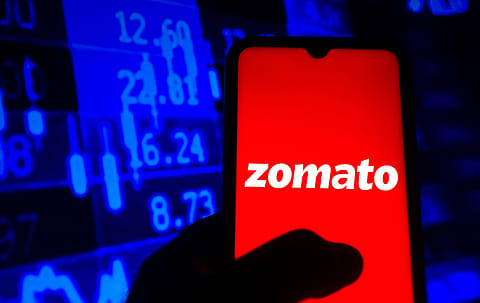Zomato IPO: Uber laughs all the way to the bank
After booking profit on Uber Eats sale, the ride hailing app is sitting on 5.6x gain in Zomato.

In the smashing debut of Zomato on the public market, the one investor who is looking the smartest of them all is Uber!
The ride hailing app has made a double-killing as it not only booked profits in FY20 on the sale of its food delivery business in India, Uber Eats, to Zomato, but is now sitting on mouth-watering returns without having to burn cash in fighting competition.
Uber has made 560% or 5.60x return on its “investment” in Zomato as the country’s food delivery startup ended Day 1 with a market cap of ₹98,849 crore with the stock settling 65% higher at ₹126 against its issue price of ₹76.
Read on.
In January 2020, Zomato had acquired Uber Eats' India operations in a non-cash deal for ₹1,376 crore, excluding an amount of Rs 248 crore payable towards GST. As part of the deal, Zomato issued 76,376 compulsorily convertible cumulative preference shares (CCCPS), each valued at ₹180,153, to Uber India. Subsequently, Uber India Systems transferred the CCCPS to Uber BV, which were later converted into 612,199,100 equity shares, or 9.19% stake, in Zomato.
Recommended Stories
Post the sellout, in FY20, Uber India booked a profit of ₹703.4 crore, making up for 97.6% of its full-year profit of ₹720.74 crore. Besides, in lieu of ₹1,376 crore, Uber holds a 9.19% stake in Zomato that is now worth ₹9,084 crore (as of July 23).
While the deal has fetched gains for Uber, for Zomato the deal is a loss making one as it has written off ₹233 crore as impairment in its books.
(INR CR)
This is how.
On 18 December 2020, Zomato raised $550 million in a funding round, following which, as per the agreement, the CCCPS were converted into 91,373 equity shares (currently 612 million shares with a FV of ₹1). Zomato states in the DRHP that the fair valuation of the CCCPS, as on 18 December 2020, was ₹1,609 crore, even as it recorded a loss of ₹233 crore which was treated as an exceptional item in the restated consolidated P&L. Zomato posted a loss of ₹816 crore in FY21.
The story doesn’t end here.
The Competition Commission of India (CCI) has issued a show cause notice to Zomato for failing to take approval of the regulator for the deal. Though Zomato has replied to the notice, the DRHP states that the CCI could impose a penalty of up to 1% of the combined entity’s turnover (₹1,994 crore as of FY21) or assets (₹8,704 crore as of FY21), whichever is higher.
Effectively, the cost of acquisition of Uber Eats for Zomato will not be the ₹1,624 crore that it paid. If we are to club the impairment of ₹233 crore, the transaction cost increases to ₹1,857 crore, and if the CCI slaps a fine of ₹87 crore (1% of its assets), the effective cost of the transaction will spike up to ₹1,944 crore.
While one can argue that the mammoth market cap and the cash on its books more than make up for the Uber Eats bungle, there is no denying that while Uber lost the battle it has won the food delivery war.